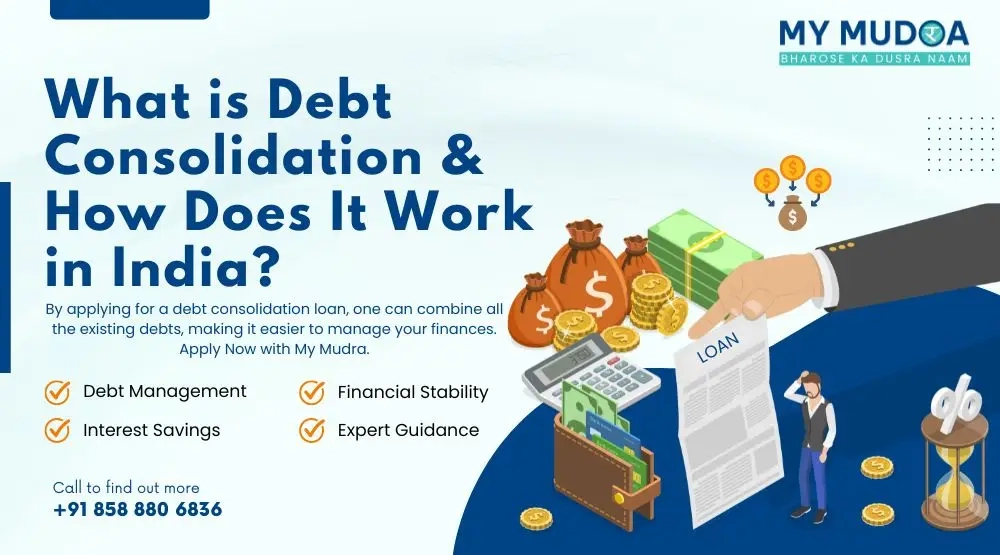What is Debt Consolidation: How Does It Work?

Debt consolidation is a financial strategy designed to help individuals manage and simplify their debt. It involves combining multiple debts, such as credit card balances, personal loans, and other unsecured debts, into a single, more manageable loan or payment plan. This approach can reduce the complexity of managing various debt payments, potentially lower interest rates, and make it easier to pay off debt over time.
How Does Debt Consolidation Work?
Debt consolidation can be executed in several ways, depending on the individual’s financial situation and the types of debt they have. Here’s a breakdown of the most common methods:
1. Debt Consolidation Loans
A debt consolidation loan in India is a personal loan taken out specifically to pay off multiple existing debts. Once the new loan is approved, the lender pays off the existing debts, leaving the borrower with just one loan to manage. Ideally, the debt consolidation loan comes with a lower interest rate than the original debts, which can save money over time and make repayment easier.
How It Works:
-
The borrower applies for a loan, typically with a bank, credit union, or online lender.
-
Upon approval, the lender disburses funds to pay off the borrower’s existing debts.
-
The borrower then repays the consolidation loan through fixed monthly payments over a specified term, usually with a lower interest rate and possibly a longer repayment period.
2. Balance Transfer Credit Cards
A balance transfer credit card allows borrowers to move multiple high-interest credit card balances to a single card, often with a low or 0% introductory interest rate for a set period (e.g., 12-18 months). This method is most effective for individuals with credit card debt who can pay off their balance within the promotional period.
How It Works:
-
The borrower applies for a balance transfer credit card, ideally with a 0% introductory APR offer.
-
Once approved, the borrower transfers the balances from their existing credit cards to the new card.
-
During the introductory period, the borrower makes payments without accruing additional interest, allowing them to pay down the principal more effectively.
-
After the introductory period ends, any remaining balance is subject to the card’s regular interest rate.
3. Home Equity Loans or Home Equity Lines of Credit (HELOCs)
Homeowners with significant equity in their property can use a home equity loan or HELOC to consolidate debt. These loans use the home as collateral, which often results in a lower interest rate compared to unsecured loans.
How It Works:
-
The borrower applies for a loan or line of credit based on the equity in their home.
-
If approved, they use the funds to pay off existing debts.
-
The borrower then repays the home equity loan or draws from the HELOC, with interest payments typically being tax-deductible.
4. Debt Management Plans
A debt management plan (DMP) is a service offered by credit counseling agencies to help individuals manage their debt. The agency negotiates with creditors on behalf of the borrower to lower interest rates, reduce fees, and create a manageable repayment plan.
How It Works:
-
The borrower works with a credit counseling agency to assess their financial situation.
-
The agency negotiates with creditors to reduce interest rates and fees.
-
The borrower makes a single monthly payment to the agency, which then distributes the funds to creditors.
-
The DMP typically lasts three to five years, during which the borrower avoids taking on new debt.
Benefits of Debt Consolidation
-
Simplified Payments: Managing a single payment instead of multiple due dates and amounts reduces stress and the likelihood of missed payments.
-
Lower Interest Rates: If the consolidation loan or method offers a lower interest rate, borrowers can save money on interest over time.
-
Fixed Repayment Schedule: Debt consolidation loans usually come with a fixed repayment schedule, making it easier to plan and budget.
-
Potential Credit Score Improvement: Consistently making on-time payments can improve your credit score over time.
Risks and Considerations
-
Potential for Higher Costs: Extending the repayment period might lower monthly payments but could result in paying more interest over time.
-
Fees: Some consolidation methods, like balance transfer cards or home equity loans, may involve fees that can add to the overall cost.
-
Risk of Losing Collateral: With secured loans like home equity loans, failing to repay the debt could result in the loss of your home.
-
Not Addressing the Root Cause: Consolidation may simplify debt management, but it doesn’t solve underlying issues like overspending or insufficient income.
Is Debt Consolidation Right for You?
Debt consolidation loan India can be a smart choice for those who are struggling to manage multiple debts with high interest rates. However, it’s essential to consider your financial situation, the total cost of consolidation, and your ability to make consistent payments. It’s also advisable to seek advice from a financial advisor or credit counselor to explore all available options before proceeding.
In conclusion, debt consolidation is a valuable tool for simplifying debt management and potentially lowering the cost of debt. However, it requires careful consideration and discipline to ensure it leads to financial stability rather than further debt accumulation.
- Art
- Causes
- Crafts
- Dance
- Drinks
- Film
- Fitness
- Food
- Oyunlar
- Gardening
- Health
- Home
- Literature
- Music
- Networking
- Other
- Party
- Religion
- Shopping
- Sports
- Theater
- Wellness


